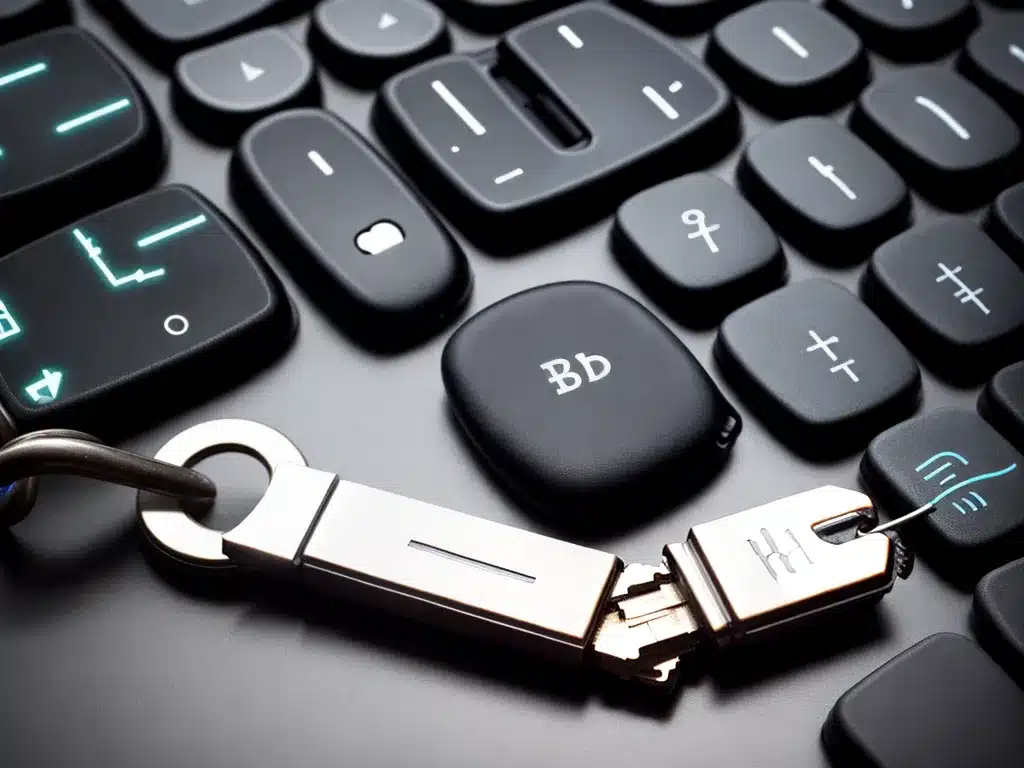
Hardware security keys are physical devices that provide an additional layer of protection for your online accounts. Here is an in-depth look at this emerging technology and how it can help better secure your data:
What Are Hardware Security Keys?
Hardware security keys are physical devices that connect to your computer or smartphone via USB or Bluetooth. When enabled for an online account, they provide a second layer of authentication on top of your username and password.
This is how they work:
- When you try to login or make a sensitive transaction, you will be prompted to tap or insert your hardware key.
- The key then communicates with the service you are accessing via cryptographic protocols to verify your identity.
- Once your identity is confirmed, you will be able to gain access to your account or approve the transaction.
In simple terms, hardware keys strengthen account security by requiring physical possession of a personalized device on top of knowledge of your account password.
Some examples of popular hardware keys include:
- YubiKey
- Google Titan Security Key
- Feitian MultiPass
- Thetis FIDO U2F Security Key
How Do Hardware Keys Enhance Security?
Hardware security keys offer stronger protection in several ways:
Two-Factor Authentication
Hardware keys enable two-factor authentication (2FA) by acting as the second factor. The first factor is your password, and the second is physical possession of your personalized hardware key.
This protects against password theft and many types of phishing attacks, since cybercriminals won’t be able to access your account without also stealing your physical key.
Phishing Resistance
Hardware keys are resistant to man-in-the-middle (MITM) phishing attacks.
When you use a hardware key, your computer or device communicates directly with the online service to verify your identity. This prevents criminals from intercepting your login credentials even if you are on a compromised network.
Built-In Cryptography
Hardware keys use FIDO (Fast IDentity Online) authentication protocols and have built-in cryptography. This allows them to securely verify identities without revealing any personal information over the internet.
The private keys for the authentication are stored securely on the device and never leave it. This provides strong protection against potential vulnerabilities in software-based systems.
Ease of Use
Hardware keys are designed to be easy and intuitive to use. Once configured, logging in simply requires plugging in the key via USB or tapping it against your device when prompted.
No complex passwords or one-time codes need to be manually entered each time. This makes consistently using strong 2FA effortless compared to less user-friendly options like SMS codes.
Which Online Accounts Support Hardware Keys?
Many major online platforms now support enabling hardware security keys for account protection:
- Google Accounts – Gmail, Drive, etc
- Microsoft Accounts – Outlook, OneDrive, etc
- GitHub
- Dropbox
- Salesforce
In addition, most password managers like LastPass, 1Password, and Dashlane also allow using hardware keys as an option for enhanced security.
Certain hardware keys are also designed to work specifically with iPhone or Android devices for account protection and user authentication.
How Many Hardware Keys Should You Have?
Security experts recommend having at least two hardware keys from different manufacturers for each online account that supports them.
Here’s why:
-
Having keys from two brands ensures you have a backup if you lose one of your keys.
-
It also protects against the (unlikely) scenario where a vulnerability is found in keys from a specific manufacturer.
-
Registration of the 2nd key is done securely using the first key to prevent any vulnerability during the enrollment process.
-
The 2nd key is stored safely offline for backup purposes. It is not used regularly but available if the primary key is lost or damaged.
So in summary, use two keys and register them separately for optimal security.
Which Hardware Key Should You Buy?
Here are some things to consider when choosing a hardware security key:
-
Reputable brand – Go with recognizable established brands like YubiKey, Google Titan, Feitian etc. Avoid keys from lesser known companies.
-
FIDO Certified – Ensure the key is certified for the latest FIDO2 and U2F protocols. This guarantees interoperability and future-proofing.
-
USB, NFC, and Bluetooth support – Look for a key that provides multiple connectivity options for flexibility across devices.
-
Durable design – Pick a sturdy key that can withstand drops, knocks, liquids etc. Metal casings provide greater durability than plastic.
-
Tamper protection – Hardware protections that erase sensitive data in case of physical tampering attempts provide additional security.
-
Ease of use – Ensure the key is easy to set up, register, and use on a daily basis. Complicated keys tend to get abandoned.
-
Price – More expensive keys tend to offer greater durability and feature sets. But decent options are available under $50 as well.
Following these criteria will help you select a hardware key that balances security, usability, and budget for your specific needs.
Wrapping Up
Hardware security keys offer a robust additional line of defense for online accounts by requiring physical verification in addition to passwords. This protects against many common threats like phishing, malware, and password theft.
Major platforms like Google, Microsoft, Facebook, and Dropbox now enable using these keys for account security.
For optimal protection, use FIDO certified keys from reputable brands, register two back up keys per account, and store one key offline. As hardware security keys become more widespread, they have the potential to effectively eliminate many types of cybercrime.
So don’t just rely on a password alone – add hardware key two-factor authentication to better defend your valuable online data against constantly evolving threats.












